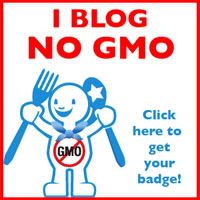Animals fed GMO corn, for example, developed problems of their blood (leukemia), blood pressure, kidney, liver (including significant changes in kidney weight as well as lesions on the kidney and liver), allergies to infection, increased blood sugar levels, diseases, and yes, even cancer. These are not minor problems. These are toxic reactions to a poison. (Even if the same doesn't occur in humans, think of the repercussions of us eating the meat of animals that are fed the GMO corn and are therefore unhealthy animals!)
Corn and Soy are the top two genetically modified crops and are two of the largest crops. You can find corn and soy in practically every processed food. Chickens and cows are fed corn and soy on feedlots (another reason to choose only grass-fed meats and organic free range chicken and eggs) so the problem is multiplied down the food chain.
Graph shows geographic breakdown of GM corn 1999, European Commission on Agriculture
Then there is nature's way of cross-pollinating crops naturally and it becomes clear that our entire food line is in jeopardy. The real fear is that at some point, it will be difficult to find any corn and soy that is not genetically modified. When we think of how many products use corn as a base and then the animals that are regularly fed this, we can easily see how this is a huge experiment with our lives and the health of humans everywhere as well as our entire food system and future.
The goal of GMO crops is to make them less susceptible to pests, more resistant to drought and stronger overall. The actual result however, is quite different. These “Frankensteins” can now reproduce so "super weeds" are cropping up and, you guessed it, stronger pesticides are needed to get rid of those just as overuse of antibiotics has created stronger strains of disease in humans. That's even MORE chemicals and toxins forced into our environment and our food. Injecting foreign organisms into foods changes how our body will use it nutritionally (many crops now offer less protein, for example) and creates new allergies and toxins that must be fought off with additional chemicals and drugs.
A vicious cycle, (or is it a planned action for profit?), the companies who are sponsoring this research and use include pharmaceutical companies like the drug company that owns Monsanto which creates weed killer (and Nutrasweet), and corporations like Phillip Morris which owns Kraft Foods.
GE allows these big companies to control our food, the farmers, the pesticides, and the food chain itself.
 Since the U.S. requires no special labeling when a product contains anything GMO, just as there is no requirement that a piece of meat be labeled “cloned” when it is of a cloned animal, unbeknownst to us, we are active participants in this huge experiment. European countries have restricted GM foods and require clear labeling, but the U.S. falls far behind in this and we are actively growing GMO foods.
Since the U.S. requires no special labeling when a product contains anything GMO, just as there is no requirement that a piece of meat be labeled “cloned” when it is of a cloned animal, unbeknownst to us, we are active participants in this huge experiment. European countries have restricted GM foods and require clear labeling, but the U.S. falls far behind in this and we are actively growing GMO foods."Seralini points out that these GM plants have far more herbicide residues in the edible portions and extensive toxicity tests must be performed. But the biotech industry claims that they could not afford to introduce GM crops if they had to pay for the tests normally required for pesticides in Europe. For GM crop approvals in the US, they spend even less. US authorities require only 30-day studies for the Bt [Bacillus thuringiensis is a natural soil bacterium injected into every cell rendering the plant itself an insecticide] plants and no safety tests whatsoever are required for herbicide tolerant varieties."*GMO crops affect our environment, our animals, our body, and our future health, and our very survival since they have repercussions upon the very essence of our existence - food. Genetic modifications of our foods introduce new food allergens, potential antibiotic-resistant bacteria, changes in nutritional value, changes in the cattle and animals that eat them that we will then consume, changes in animals and life that consume them that we appreciate for beauty and life, and potential (as of yet unconfirmed since no real studies have been done on humans, well, except for unscientific one being done every day) the changes in our body when we eat them.
What can I do to protect myself and my family?
Understand that GE crops are primarily in soy and corn (at present) and make a conscious effort to steer clear of conventional soy and corn products as well as things that contain these in their ingredients list. Take the time to educate yourself on what ingredients mean. Be particularly cautious of ingredients that mean soy and corn including corn syrup, high fructose corn syrup, malt or malt syrup, msg, maltodextrin and dextrin, corn starch, mono- and diglycerides, confectioner's sugar, baking powder (which may contain corn starch), soy lecithin or lecithin, soy sauce, tempeh, miso, teriyaki, tofu, soy milk, textured vegetable protein, tamari or shoyu, soy and corn oils as well as nonstick sprays, and any other products containing soy and corn.
 By definition, organic foods are not genetically altered. Choose organic whenever possible and particularly those things that your family eats most that contain any soy or corn in them.
By definition, organic foods are not genetically altered. Choose organic whenever possible and particularly those things that your family eats most that contain any soy or corn in them.Supporting organic farmers and not buying foods that are GMO is the best way to get rid of GE foods for good. Since this is profit driven, speaking with our wallets is louder than any letters. When we learn which foods are more likely GMO, we can let the scientists and big companies know that it's not okay with us by not purchasing their products.
Common Foods that are Genetically Modified:
angers. In particular look for High Fructose Corn Syrup as an ingredient.
Reduce your exposure to GM crops and help get them out of our food line by choosing to buy and consume products that are not genetically engineered by companies that refuse to use GMO. Look, I understand that some of these suggestions may sound impossible to you, we are each at different stages in learning and many of us have come to rely on convenience foods and don't know how to start. As a mom of four, I speak from experience that it is possible and it does get easier. Start somewhere to reduce your intake.
Choose:
- Organic over conventional when possible, especially for the top GMO items: Corn, Soy, Milk, Rice, Tomatoes.
 Non-GMO ingredients in packaged foods over conventional foods: especially if they contain soy or corn and indeed most processed foods contain both or look for "organic" or "non-GMO" on the label
Non-GMO ingredients in packaged foods over conventional foods: especially if they contain soy or corn and indeed most processed foods contain both or look for "organic" or "non-GMO" on the label- The The Non-GMO Shopping Guide to help you get started.
- Whole real foods over processed foods: This one takes a commitment and some time but there is nothing more important than the food we eat. Cook more at home, pack lunches, use whole real foods (things with one ingredient or no more than 5) instead of packaged foods, create your own homemade convenience foods to help you - it's less costly to cook at home and it's much more nutritious and with practice so much more delicious and really not that hard. Recipes will be added to the site that I use to prepare quick, healthful, meals on a budget.
- Grass-fed meats over grain-fed (especially over conventional grain-fed meats), rBGH-free or organic dairy (best is grass-fed dairy), organic free-range poultry and eggs
Resources:
• Shoppers Guide to GM July 2003
• Genetically Modified Foods, Inc. Mercola
• GMO LABELING LEAVES CONSUMERS IN THE DARK: GREENPEACE Greenpeace, 1997
• Far Afield: Biotech Propaganda and the Truth The Green Guide, 1999
• GMO Food Contamination is Forever Organics Consumer Association, 2002
• Hazards of Genetically Engineered Foods and Crops: Why We Need A Global Moratorium Motion Magazine, 1999
• GMO Crops Are An Accident Waiting to Happen Toronto Globe, 2001
• Superweeds are Sprouting in GMO Crops NY Times, 2003
• Genetically Modified Foods Update Organic Consumers Association BioDemocracy News July 2001
• Is Farm-Raised Salmon Bad For Your Health After All? - New report says it’s high in probable carcinogens November, 2003
• GM crops need more pesticide March 2003
• Drug Company Owns Monsanto and Their Weed Killer is What Funds GMO Crops NY Times, 2001
• Europeans More Resistant to Genetically Modified Foods April 2003
• Research Fuels Fear of Gene-Altered Fish, June 2004
• Genetically Modified Corn Study Reveals Health Damage & Cover Up*, Health Lies Exposed, 2005
• Food Safety, Risk & Technology of GMO Genetically Modified Foods, Food Science & Nutrition University of Minnesota
• The Dangers of Genetically Modified Food
General Resources for information:
• Friends of Earth
• Genetic Engineering Action Network
• Green Peace
• Mercola
• Non-GMO Report
• Organic Consumers Association
• Pure Foods
• True Food Now
• The Campaign to label foods that are genetically engineered
• Non-GMO Project
• The World According to Monsanto
• Seeds of Deception
• Say No to GMO
• The Institute for Responsible Technology
• The Non-GMO Shopping Guide




























Hip mamma! This is such an incredible, informative and fabulous article! You've outdone yourself! I'll have to broadcast your blog to my friends. Oh, and register your blog with blog directories if you haven't done so already. I know you have a lit of useful information that needs to be shared with the world and this is the perfect medium!
ReplyDeleteCongrats on your first post!
I totally agree with the comment from Edrian Thomidis!!! Since the beginning of the new year, my family has thrown out all foods/drinks with HFCS. We had a fun pantry cleaning out day. I didn't know how many items contained that nasty stuff! My son is 2 and we want to start leading a more healthy lifestyle. We would love to be 100% organic one day, but one step at a time. I already printed out the "non-gmo shopping guide" you posted and I can't wait to start going by it. I love your blog and I hope you are around for a long, long, long time!!! Keep the wonderful recipes coming!
ReplyDeletevery comprehensive post. I have been reading up your blog and luv it. you are so thorough on everything. My comments my be random- I am having trouble posting them- browser issues.
ReplyDeleteOh this is great stuff! We (by "we" I mean the RealFoodMedia.com bloggers) will be hosting a Non-GMO challenge in the not-too-distant future.
ReplyDeleteThanks for sharing!!
-KristenM
(AKA FoodRenegade)
This is a super good, very informative post. Thanks a lot!
ReplyDeleteThis is fabulous! So thorough, thank you so much!
ReplyDeleteFantastic informative article, you really put alot of time and research into this, thanks for sharing!
ReplyDelete